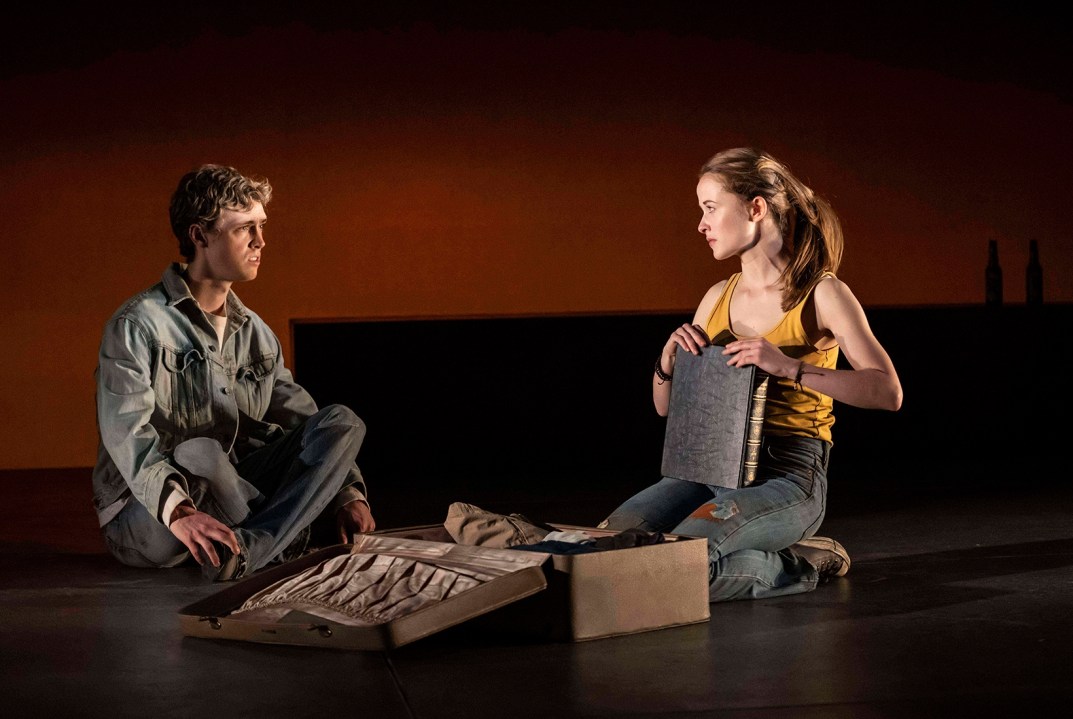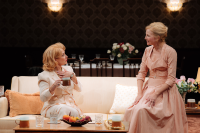Hampstead’s latest play is a knotty rape drama by Naomi Wallace set in Kentucky. Four teenagers with weird names meet in a hired basement. Hoke and Frayne are boys. Jude is a girl whose younger brother, Acton, gets bullied at school. Their chat is aggressive, cynical and funny. Jude boasts that she’s already lost her virginity but she’s proud to have slept with just two men: ‘You’ve got to do six or seven to qualify for slut.’ Hoke claims to have groped his 34-year-old aunt when she was drunk, ‘but she never knew it happened so in a way it didn’t’. Great opening dialogue.
Wallace’s attitude to sexual assault is curiously detached. She seems to think rape is ‘just one of those things’
Then it all goes haywire. Hoke and Frayne plot to drug and rape Jude at her birthday party. Acton discovers the plan and reveals it to Jude. And what does she do? Well, she lets the rapists go ahead and rape her, of course, and she tells Acton to monitor the crime from the staircase. Yes, that’s the plot: a teenage girl swallows an animal tranquiliser – strong enough to knock out a cow – and lets two perverts attack her while her brother looks on. ‘Time it,’ Jude tells Acton. ‘They get 20 minutes with me… When they’re done you kick ’em out.’ Her motive, rather incredibly, is to retain the goodwill of Hoke and Frayne because they protect Acton at school.
The rest of the play, set 14 years later, is a sort of tribunal in which Jude discusses the crime with her attackers. The men are grown up by now and they say boring things like: ‘It’s movie night with the kids – popcorn and Twizzlers.’ They seem monumentally unbothered by the consequences of their crime. Same goes for Jude. She never for a moment considers calling the cops. But why not? Hard to fathom. A play about a secret plot to rape and drug a schoolgirl could easily make a great psychological thriller. But the writer gives away her biggest surprise, Jude’s foreknowledge of the plan, very early on and the rest of the script feels like an academic conference about what the boys did to Jude and why. And the fate of Acton is revealed in the first 20 minutes as well, so his story is devoid of surprise. Wallace’s attitude to sexual assault is curiously detached and humdrum, and she seems to believe that rape is just ‘one of those things’ that naughty teenagers get up to. The thrifty staging reflects the static pace of this low-energy play. The characters stand around on an empty platform, talking and talking. But nothing they say reveals the show’s arbitrary and shifting chronology. The rape happens in 1977 and the post-rape seminar occurs in 1991. How are you supposed to know that? You have to guess. Or, better still, you have to buy the script and read it during the show to make sense of the play. That’s a pretty fundamental error.
At the end of each scene, the characters lie down and perform backward somersaults before taking up their positions for the next piece of action. Perhaps these symbolic rotations are meant to advertise the play’s immense cultural significance. And yet not all performers follow this ritual. At biochemistry lectures, for example, the professors don’t lie down and turn backward somersaults to lend weight to their teachings. Perhaps they should try it.
The Dwarfs, by Harold Pinter, is a drama about three East End lads approaching adulthood in the early 1950s. Fans will enjoy seeing early sketches of Pinter’s best-known characters. Len is a hyperactive misfit who drifts from one dead-end job to another. His party piece is to recite the 15-mile night-bus route from Notting Hill to central Hackney. Pete is an angry intellectual poser with a Christ complex who mistreats his submissive girlfriend, Virginia. And Mark is a dashing actor who asks Virginia, flirtatiously, if she’s able to run through snow without leaving a footprint. Doubtless a chat-up line used by Pinter himself. The show, skilfully directed by Harry Burton, captures the flat, drab atmosphere of the 1950s. Mark finds Virginia in the kitchen, staring through a window. ‘What are you doing?’ he asks. ‘Watching it get dark,’ she says. In pre-internet days, that counted as an activity. When the pals discuss Hamlet, Virginia declares that the Prince is a charmless nutcase, obsessed with his headaches, who enjoys sticking his knife into people. This subversive quip causes Pete to explode with rage and he tells Virginia never again to pontificate about literature in front of his mates. Instead of retaliating, Virginia meekly accepts that Pete’s male intellect is a finer instrument than her feeble lady brain.








Comments